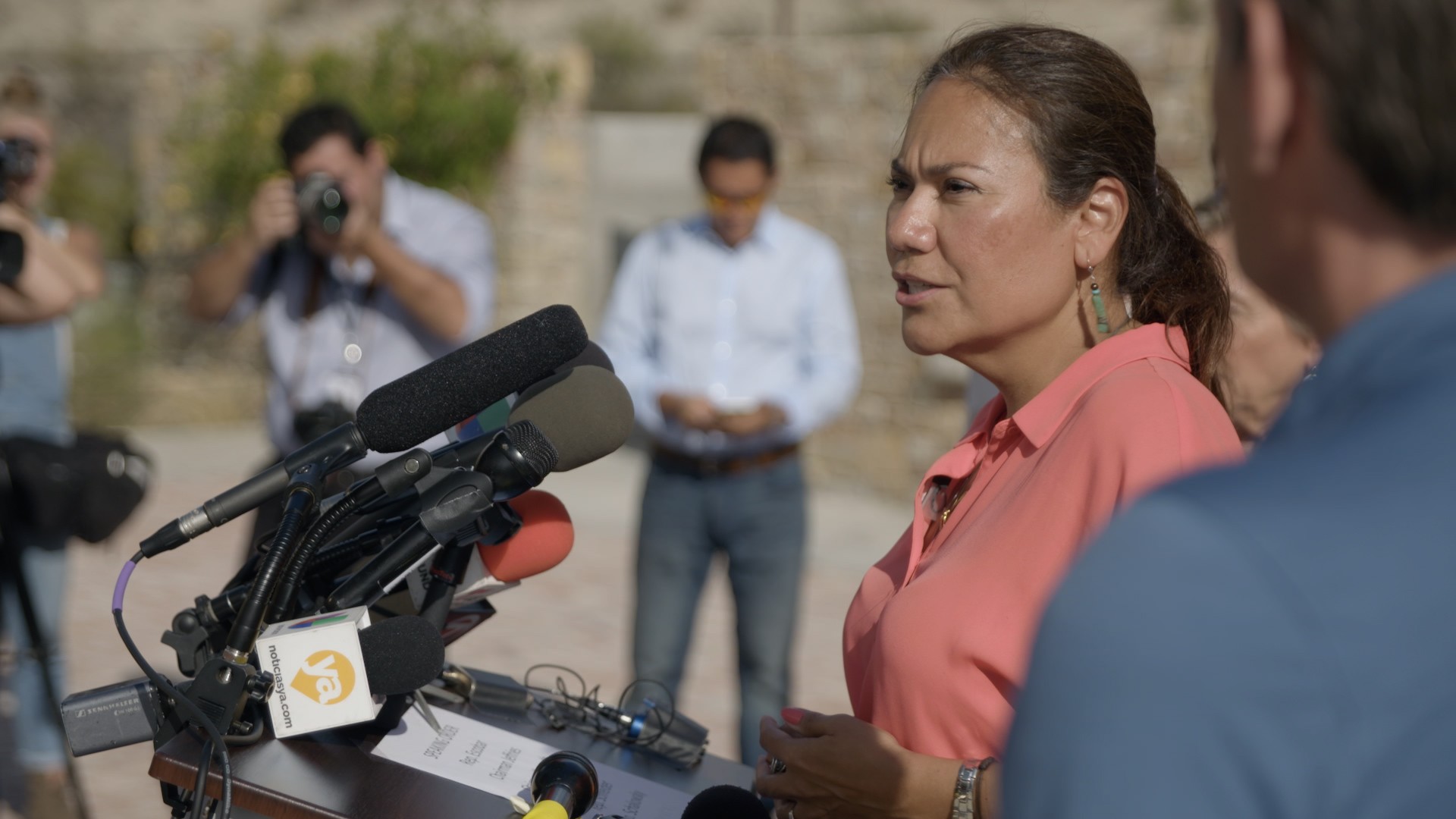Want the best of VICE News straight to your inbox? Sign up here.WASHINGTON — Congress heads back to work in the wake of yet another mass shooting, this time a rampage in Odessa, Texas, that left at least seven dead and 22 wounded, including a toddler who was shot in the face.While there've been lengthy discussions between the White House and various senators about potential gun control legislation since the twin tragedies in El Paso and Dayton one month ago, no one, including President Trump’s own allies, seems sure whether he really wants to get anything done.Without his support, bills to tighten background checks and help states with red-flag laws, or “extreme risk protection orders” to keep guns out of the hands of unstable people, are dead on arrival.“This is a simple question: Is President Trump willing to endorse a background check proposal that the NRA opposes?” Sen. Chris Murphy (D-Conn.), who's leading the push on universal background checks, told VICE News last week. “If the president doesn’t put his imprimatur on a specific proposal, then there’s no way to get Senate Republicans in any significant number.”The House Judiciary Committee will return Wednesday to begin work on a trio of gun control bills after the August recess, while the Senate returns next week to tackle its own legislation focusing on background checks and red-flag laws.Trump made it clear that the Odessa shooting hadn’t changed his thinking on guns.“We’re looking at the same things. This really hasn’t changed anything. We’re doing a package,” Trump told reporters on Sunday. “A lot of people are talking about it and that’s irrespective of what happened yesterday in Texas.”And he poured cold water on the idea that tightening background check restrictions would help the situation, while blaming a struggling mental health system — a favorite fallback point for the NRA.“Background checks — I will say that for the most part, sadly, if you look at the last four or five, going back even five or six or seven years — for the most part, as strong as you make your background checks, they would not have stopped any of it. So it's a big problem. It's a mental problem. It's a big problem."READ: The Odessa shooter was fired from his trucking job just hours before rampageSenate Majority Leader Mitch McConnell (R-Ky.) has suggested a willingness to consider new gun legislation — but he made clear it would be on the president to lead the effort.McConnell said Tuesday that the Trump administration “is in the process of studying what they're prepared to support, if anything,” and that he expects to know what their plans will be next week.“If the president is in favor of a number of things that he has discussed openly and publicly and I know that if we pass it, it will become law, I'll put it on the floor,” he said on Hugh Hewitt’s radio show.Trump promised shortly after the back-to-back El Paso and Dayton massacres to push for universal background check legislation. “I’m looking to do background checks,” Trump said on August 7. “I think we can bring up background checks like we’ve never had before.”But less than two weeks later and after talking with senior NRA officials, he was back to parroting the NRA’s talking points on the massacres, claiming, “We already have strong background checks” and warning that new gun control measures were a “slippery slope.”While nine out of 10 Americans back universal background checks in the most recent polling of the issue, a large chunk of Trump’s most vocal base voters still oppose any new gun control laws.Former Sen. Mark Kirk (R-Ill.), one of only four Republican senators who voted for background check legislation the last time it came up in Congress, in 2013, said there was a small chance that background checks and red-flag laws could pass, but it depends entirely on Trump.Blumenthal said he expects he and Graham will finalize language and introduce a bill soon after senators return to Washington on Sept. 9 that would provide grants to states that pass red flag laws, to help law enforcement identify people who might be gearing up to commit mass violence and confiscate their guns.The red flag bill is likely an easier lift than background checks — the NRA doesn’t explicitly oppose red flag laws, though they’ve resisted more-aggressive versions in the past. The Graham-Blumenthal bill would offer grants to state law enforcement to help them partner with mental health professionals and identify potential unstable and violent actors before they act, while giving people a chance for due process if they’re deemed dangerous.Trump has shown a willingness to back small-bore gun legislation in the past — he signed a bipartisan “Fix NICS” bill coauthored by Murphy into law that strengthened reporting requirements to the FBI’s national background check database.But plenty of loopholes remain. Current law requires most gun purchases to clear background check screenings to make sure the buyers are allowed to have a gun — but that doesn’t apply to firearms sold online, at gun shows or given from one family member to another. While the exact legislation is still being worked out, Murphy, Toomey and Manchin are looking to close the gun show and internet loopholes.Lawmakers fret that a different history may repeat itself, however. After the Parkland, Fla. school shooting in early 2018, Trump talked up muscular background check legislation only to back off and pivot to talk of “hardening” schools with armed teachers and guards after talking to NRA leaders.But the NRA isn’t what it once was. The organization is facing a bevy of lawsuits and an exodus from its executive board amidst ongoing infighting that has sapped its financial resources as well as its ability to mount an effective push against any new gun control legislation. Wayne Lapierre, the head of the NRA, stands accused of trying to use the organization’s resources to buy himself a mansion, while the NRA has fired its longtime lawyers and is locked in a lawsuit against the media firm that created the now-defunct NRATV.READ: Democrats just got another path to Senate control — through Georgia“If I’m a Republican senator or a Republican thinking about 2020 in general: What do women expect me to do on this issue, what do young voters want me to do on this issue, and how bad is the dumpster fire over at NRA headquarters?” said Everytown for Gun Safety President John Feinblatt.Everytown, backed by former New York City Mayor Michael Bloomberg, is already on the air with ads pressuring a handful of GOP senators on the issue, targeting McConnell as well as Sens. Marco Rubio (R-Fla.) and Rick Scott (R-Fla.). Feinblatt wouldn’t say how much the group will spend in 2020 targeting lawmakers who opposed gun control reforms, but promised to “hold people accountable, just as we did in the midterms.” Cover: U.S. President Donald Trump speaks to the press upon arrival at the White House in Washington, DC, on September 1, 2019 after spending the weekend at the Camp David presidential retreat. (Photo: NICHOLAS KAMM/AFP/Getty Images)
Cover: U.S. President Donald Trump speaks to the press upon arrival at the White House in Washington, DC, on September 1, 2019 after spending the weekend at the Camp David presidential retreat. (Photo: NICHOLAS KAMM/AFP/Getty Images)
Advertisement
What Trump believes
Advertisement
Background checks
Advertisement
“It would require a sustained focus, which is not a core competency of the president,” Kirk said late last week.Trump made a series of calls to senators involved in the pair of gun control bills a little over a week ago, talking to Sens. Murphy, Pat Toomey (R-Pa.) and Joe Manchin (D-W.Va.) about background checks and chatting with Sen. Richard Blumenthal (D-Conn.) and his close ally, Sen. Lindsey Graham (R-S.C.), about the bipartisan legislation they’re working toward to provide state grants for red-flag efforts.READ: Harry Reid: 'Of course' Medicare for All and Decriminalizing the border are dumb ideas“There have been ongoing contacts and conversations with the White House, more so by Sen. Graham than myself, but I’ve spoken to some of the top White House staff and members of my staff have been at meetings at the White House this week,” Blumenthal told VICE News last Wednesday. “At this point we’re still unsure what the White House’s position is on a number of issues, but we’re working together to resolve whatever issues remain.”“It would require a sustained focus, which is not a core competency of the president.”
Senate red flag bill
Advertisement
Parkland redux?
Advertisement

